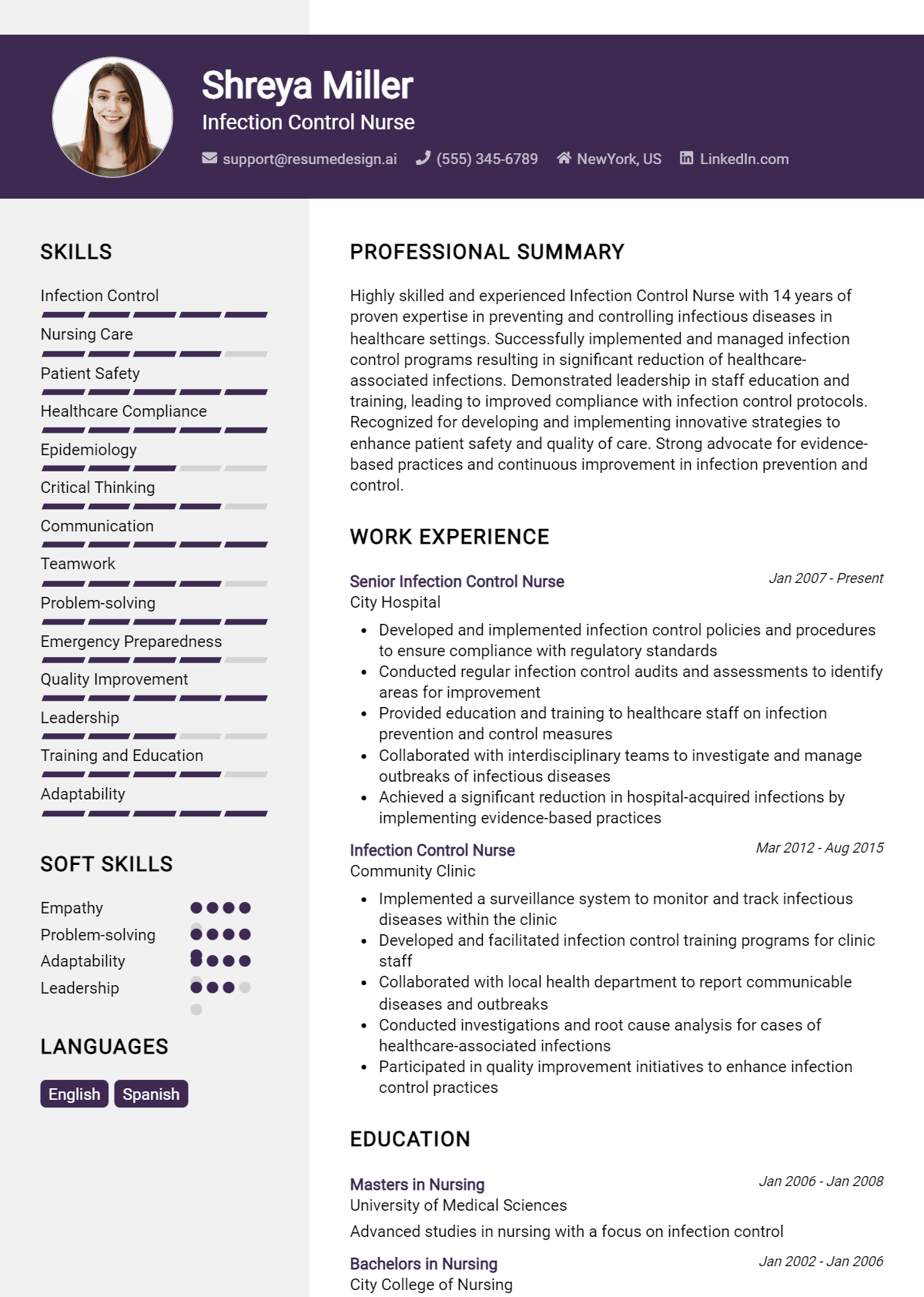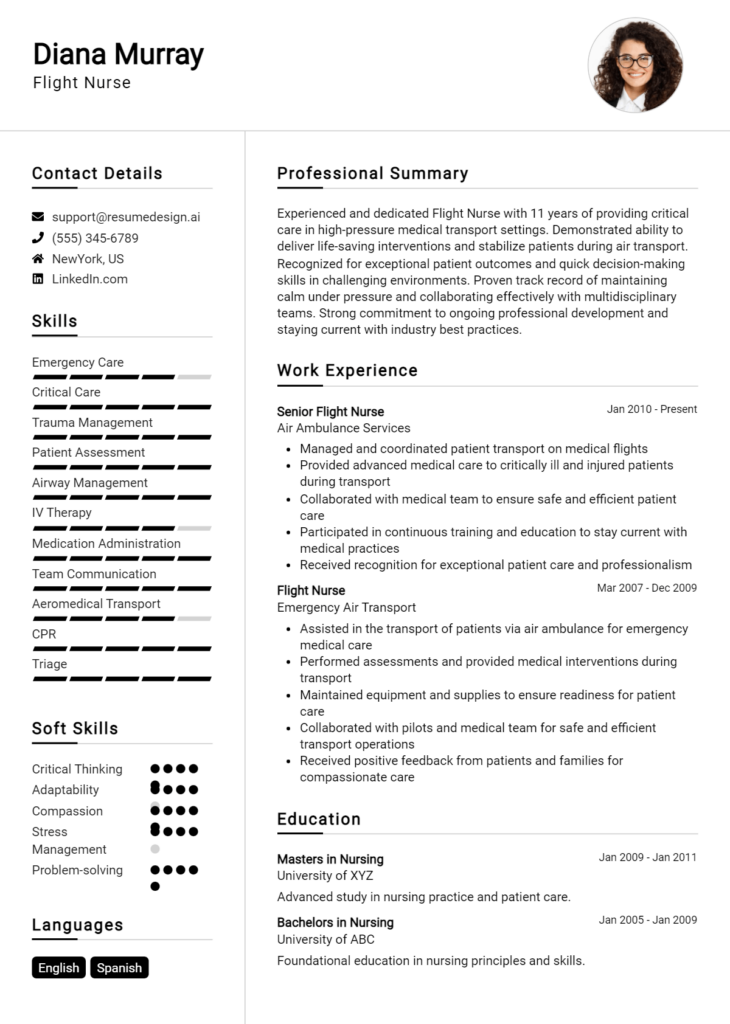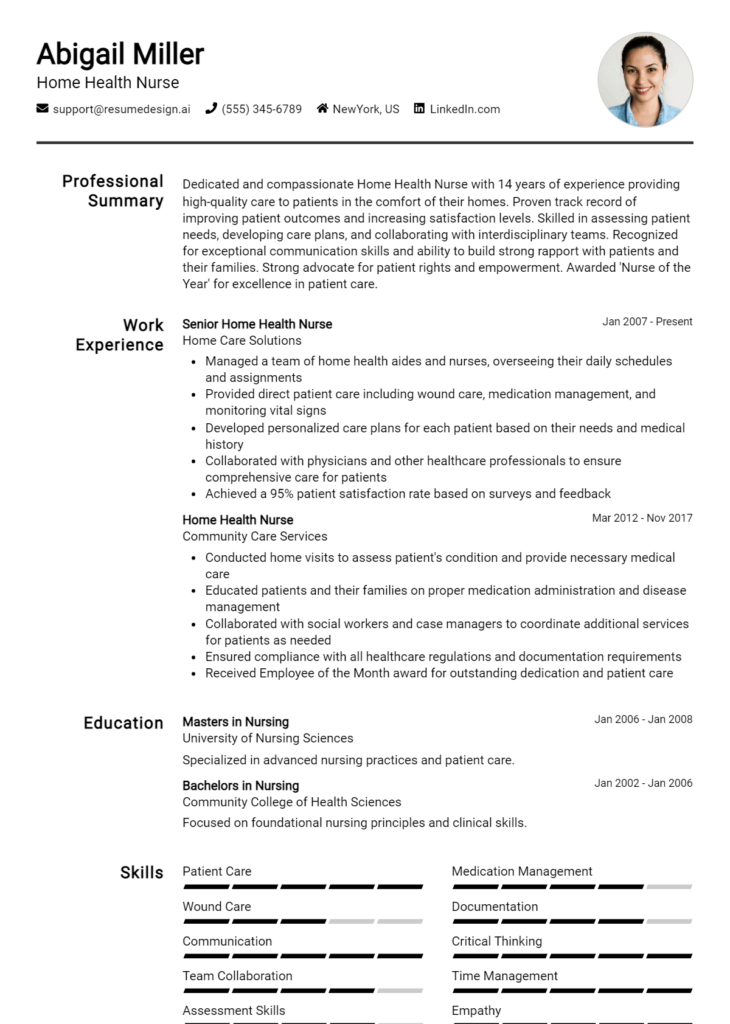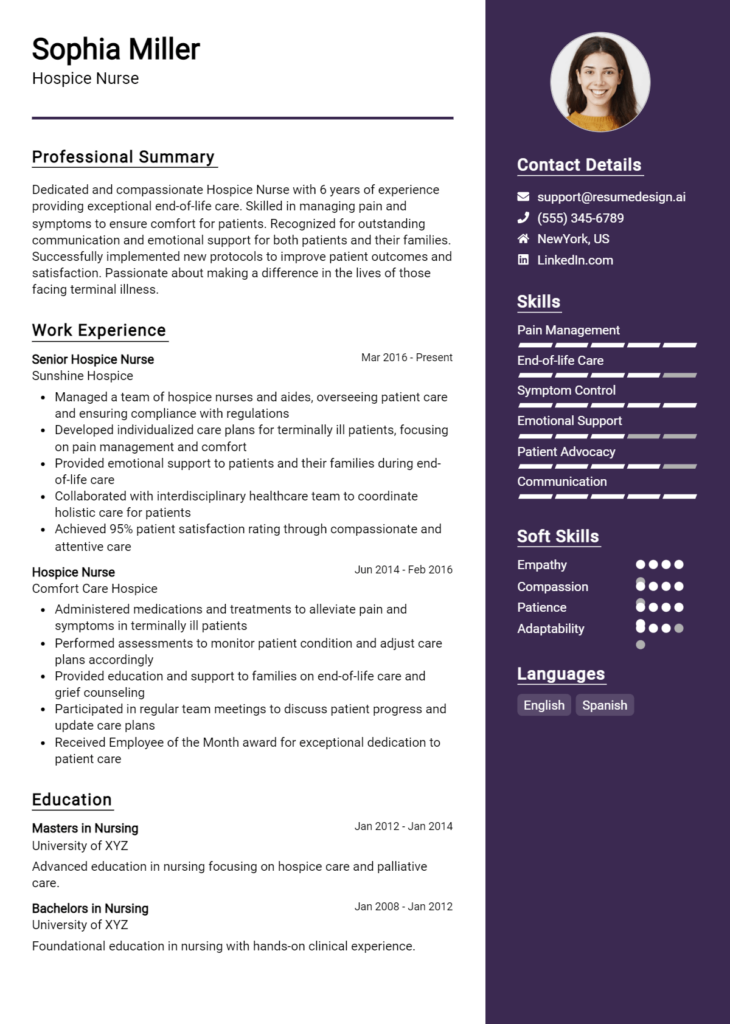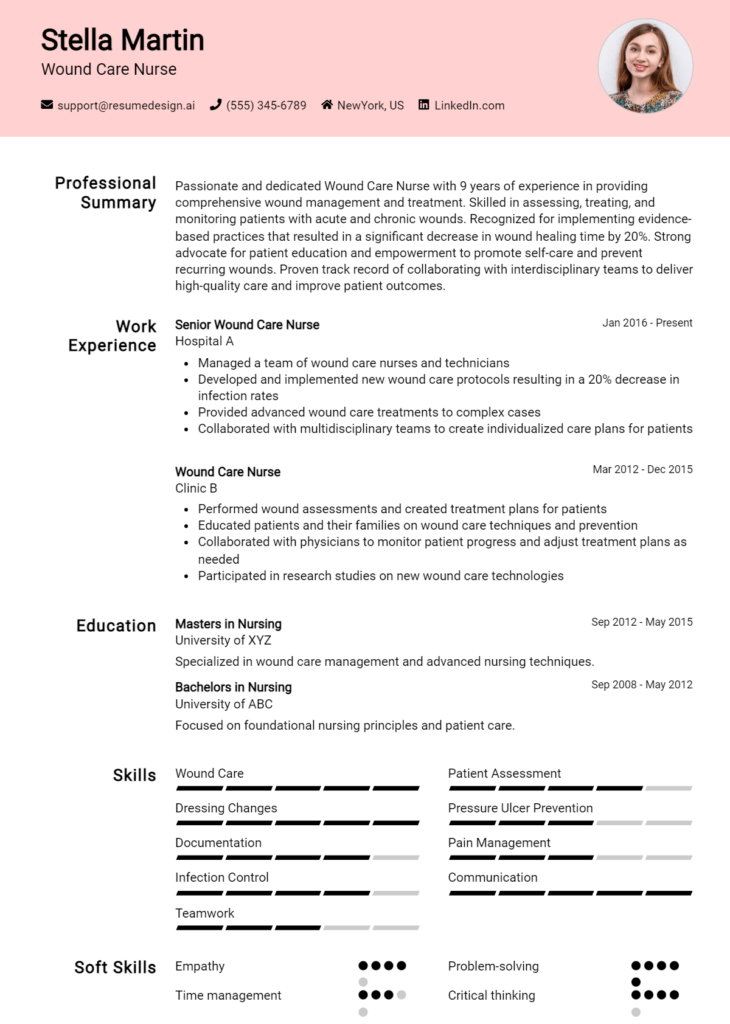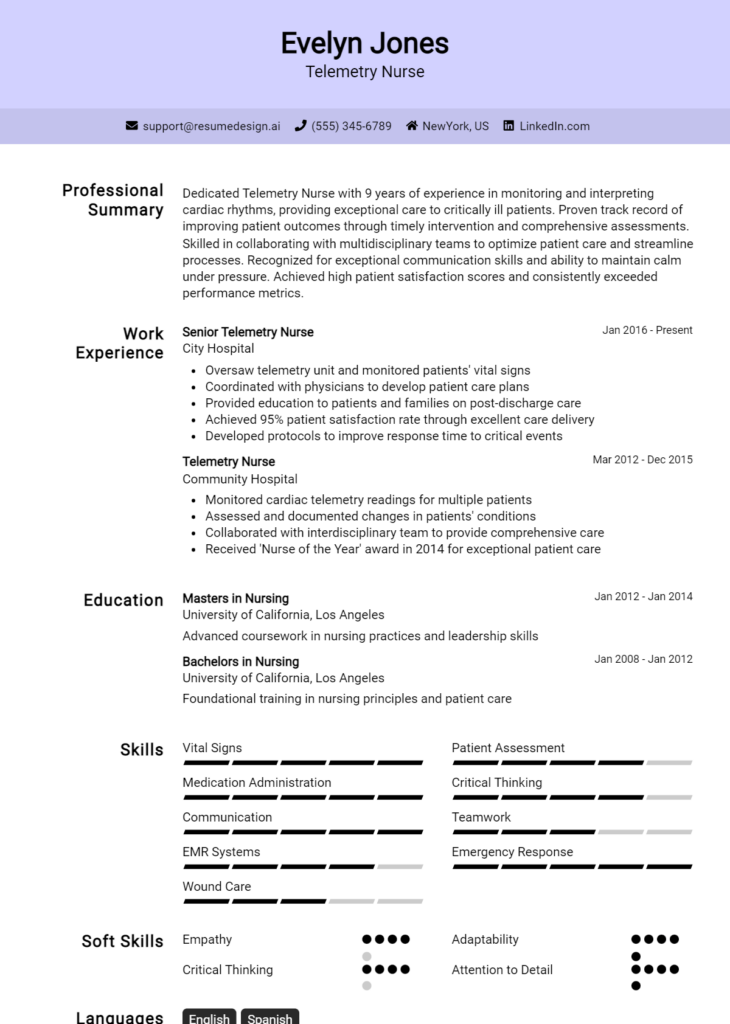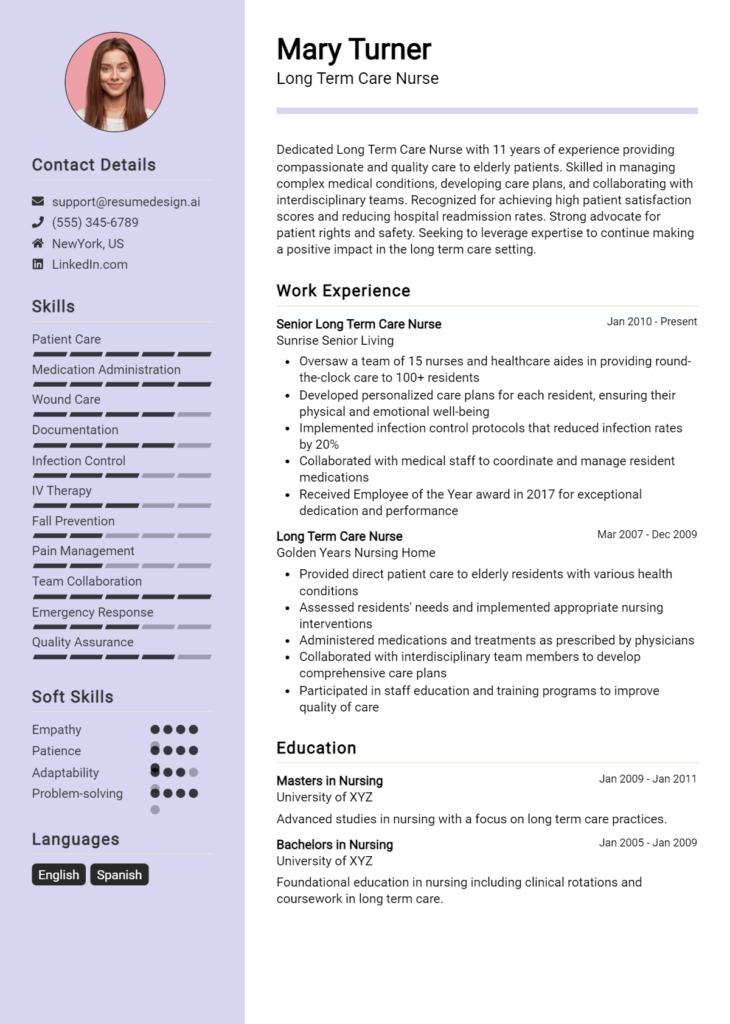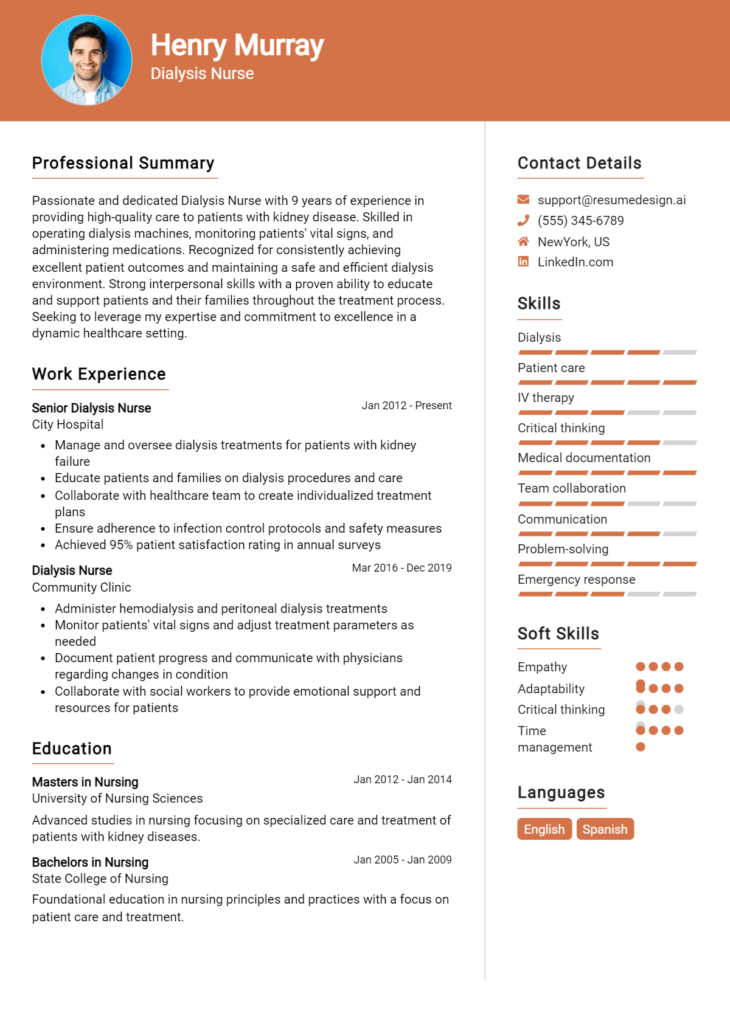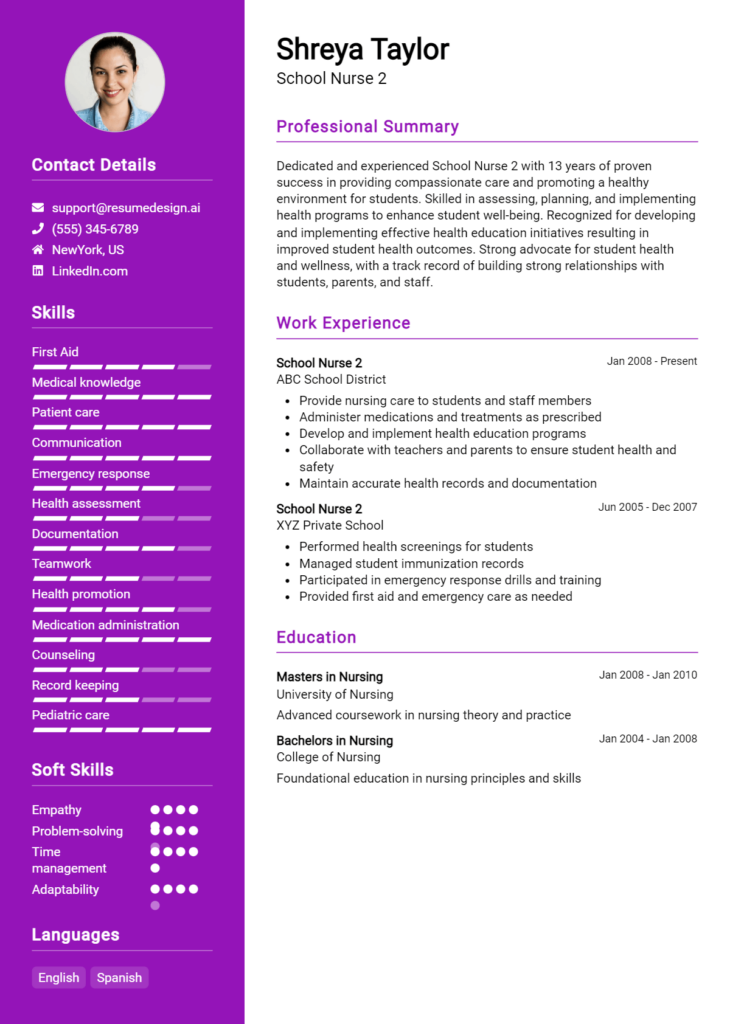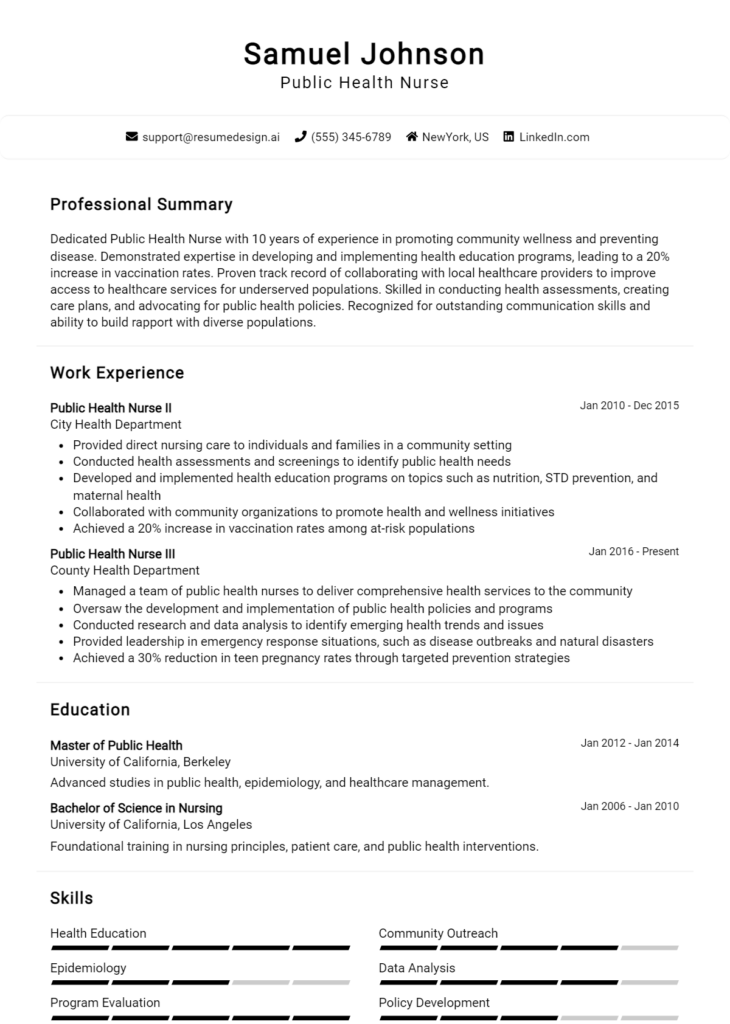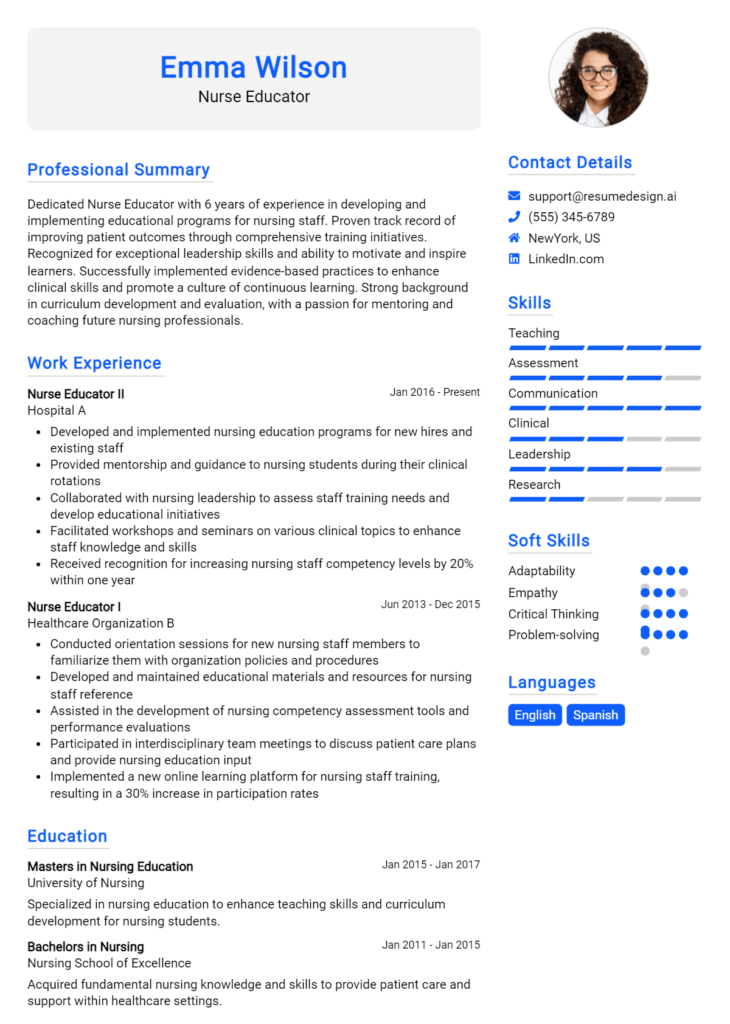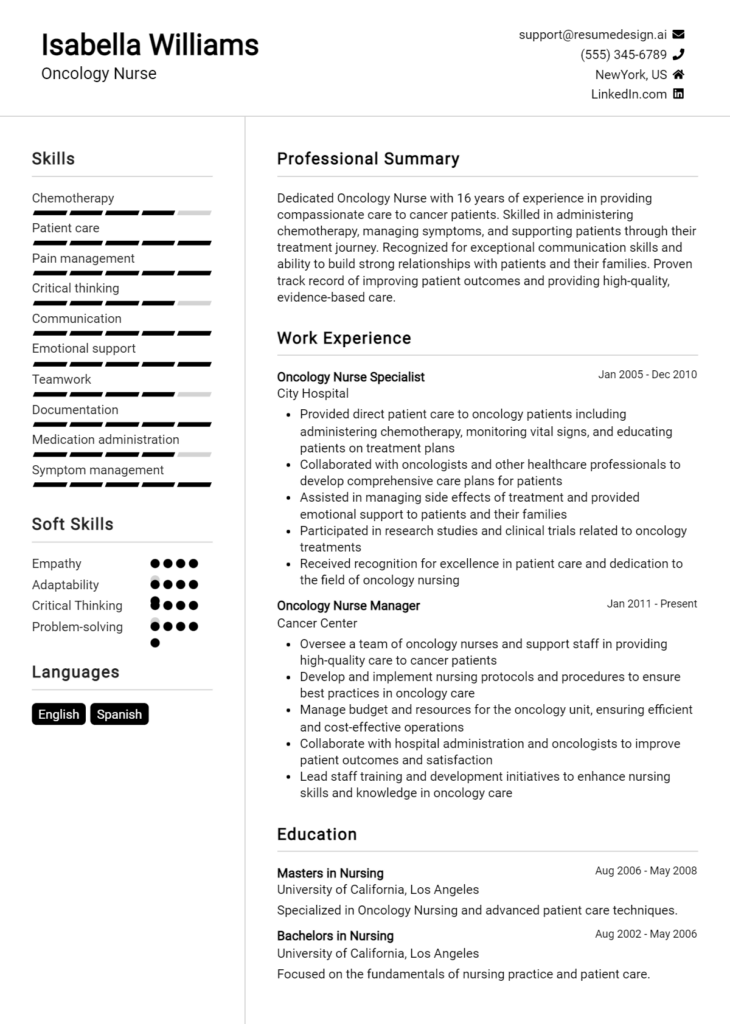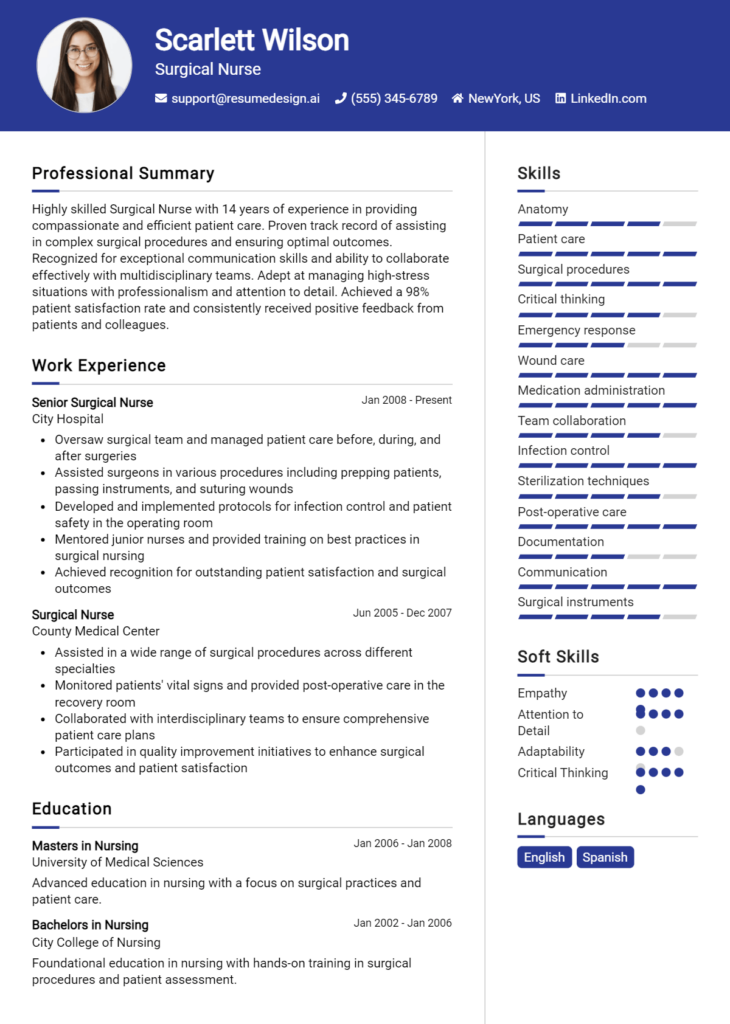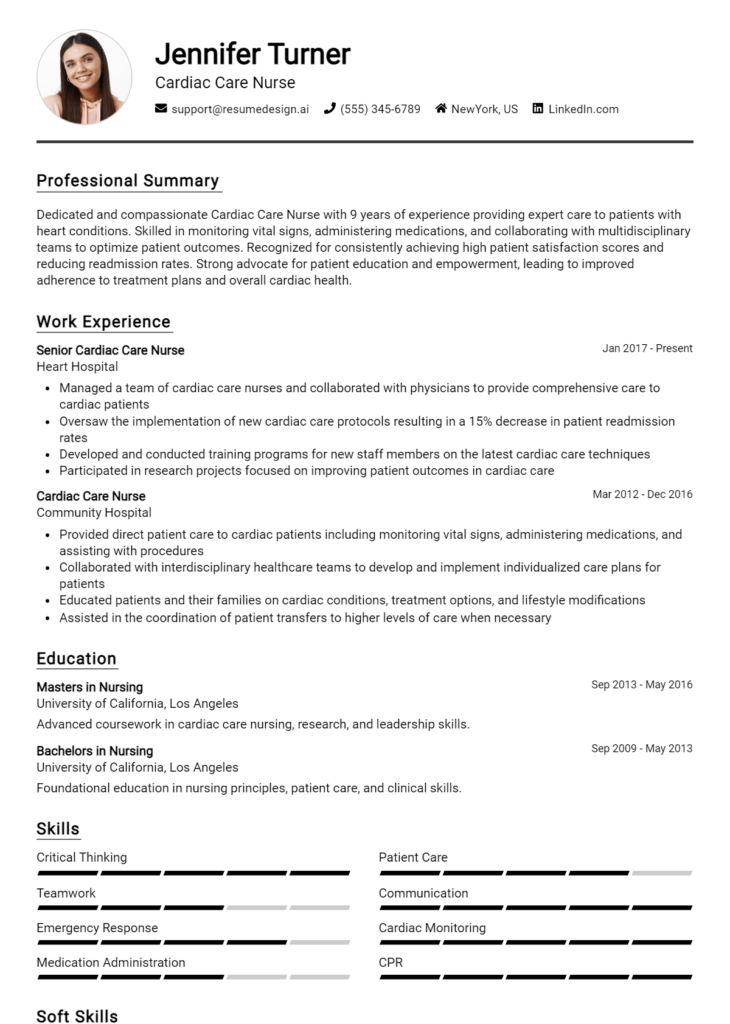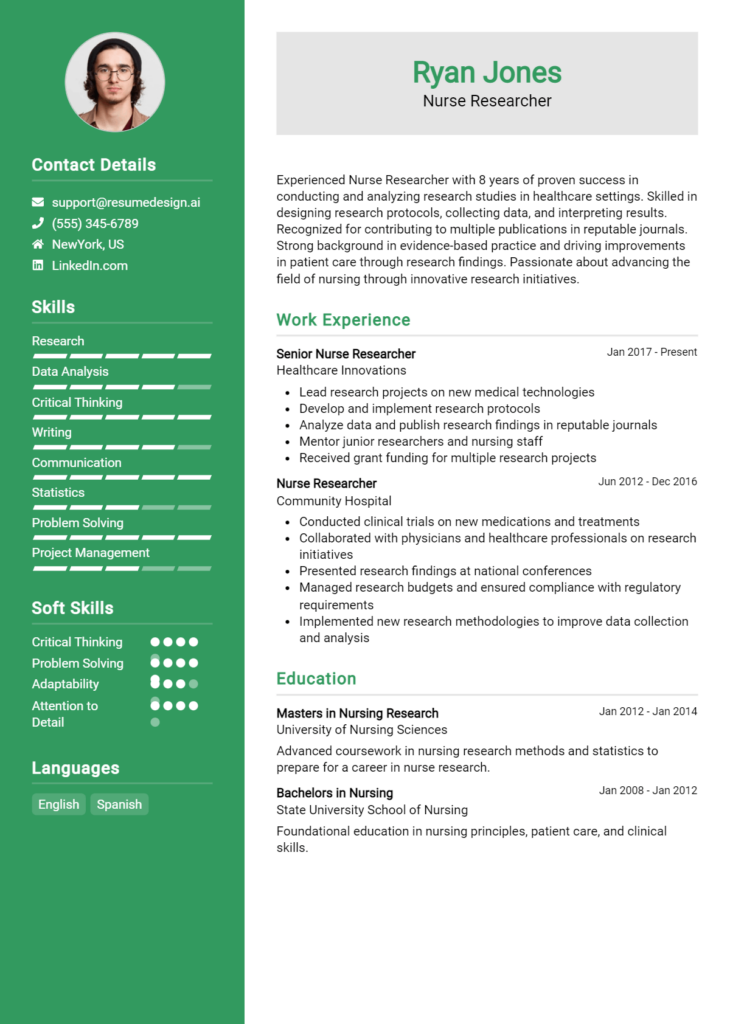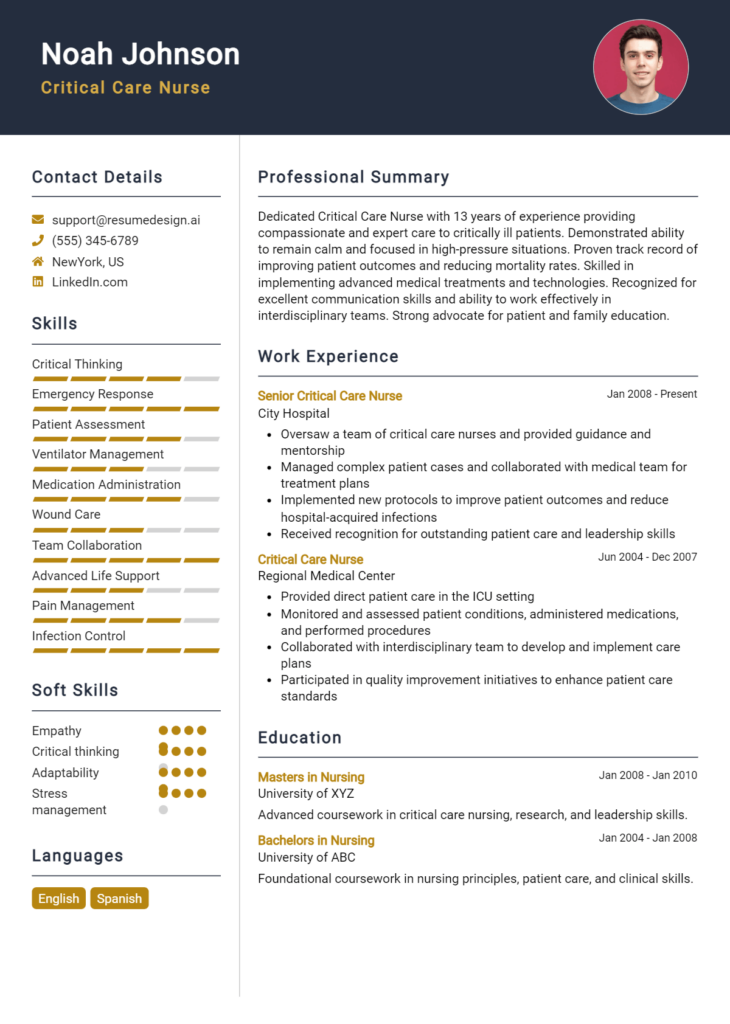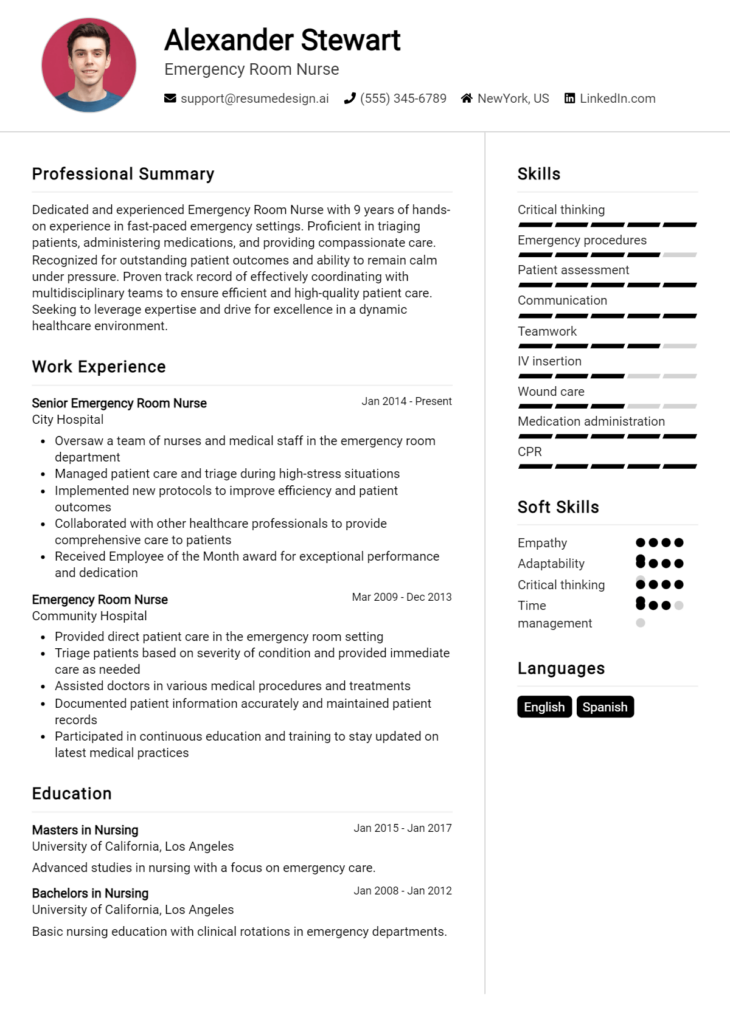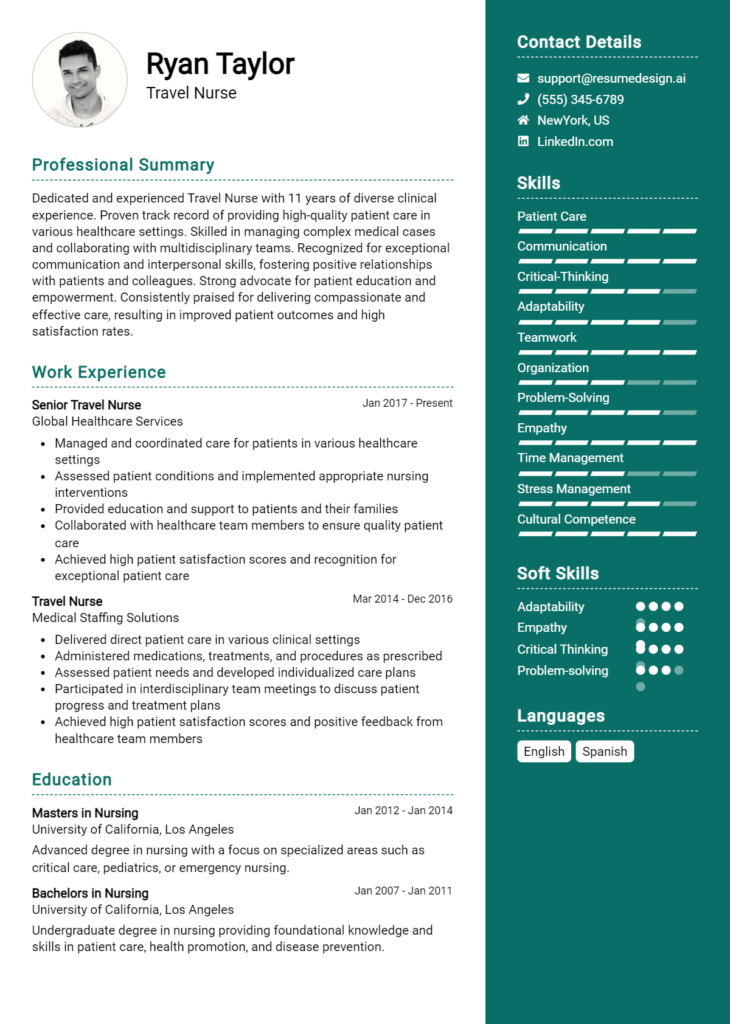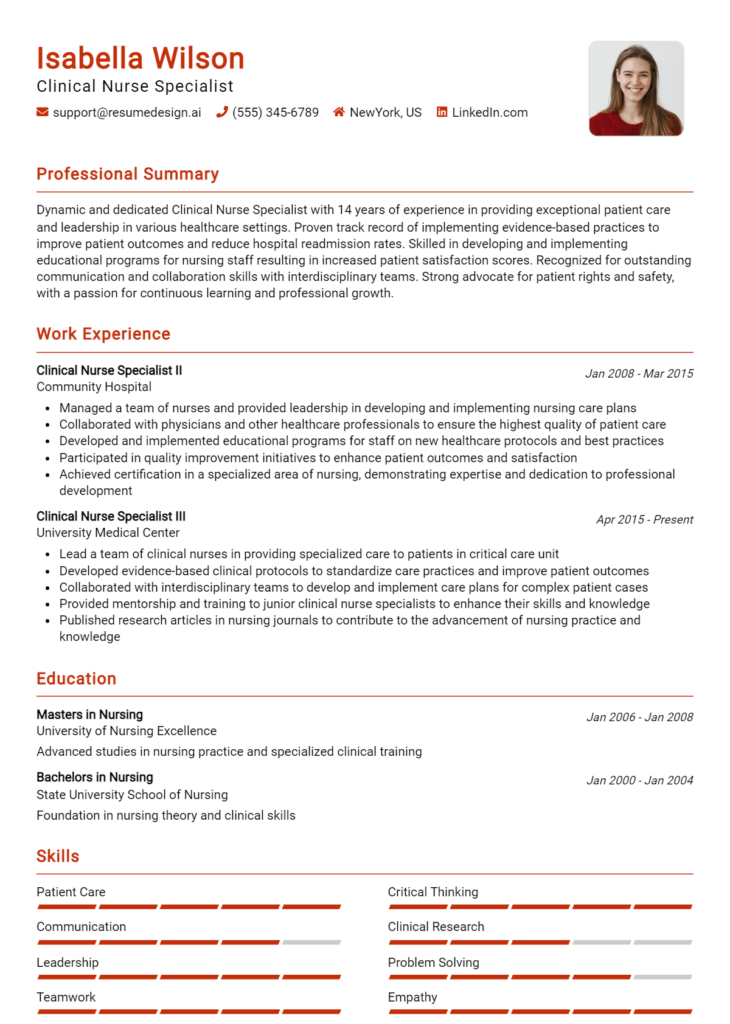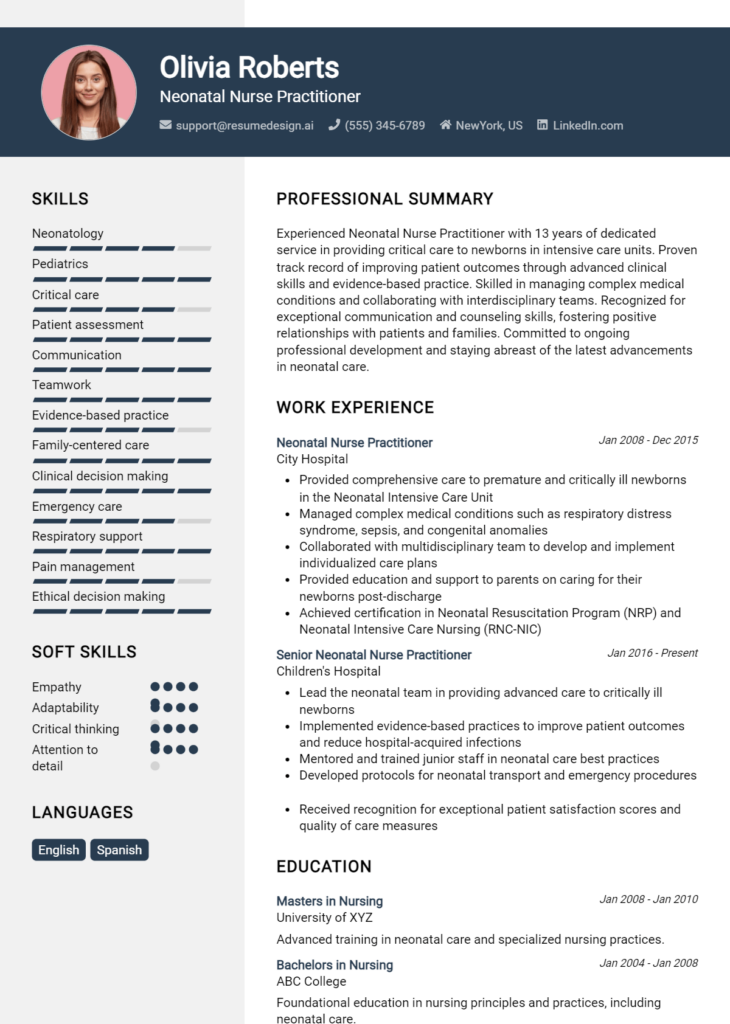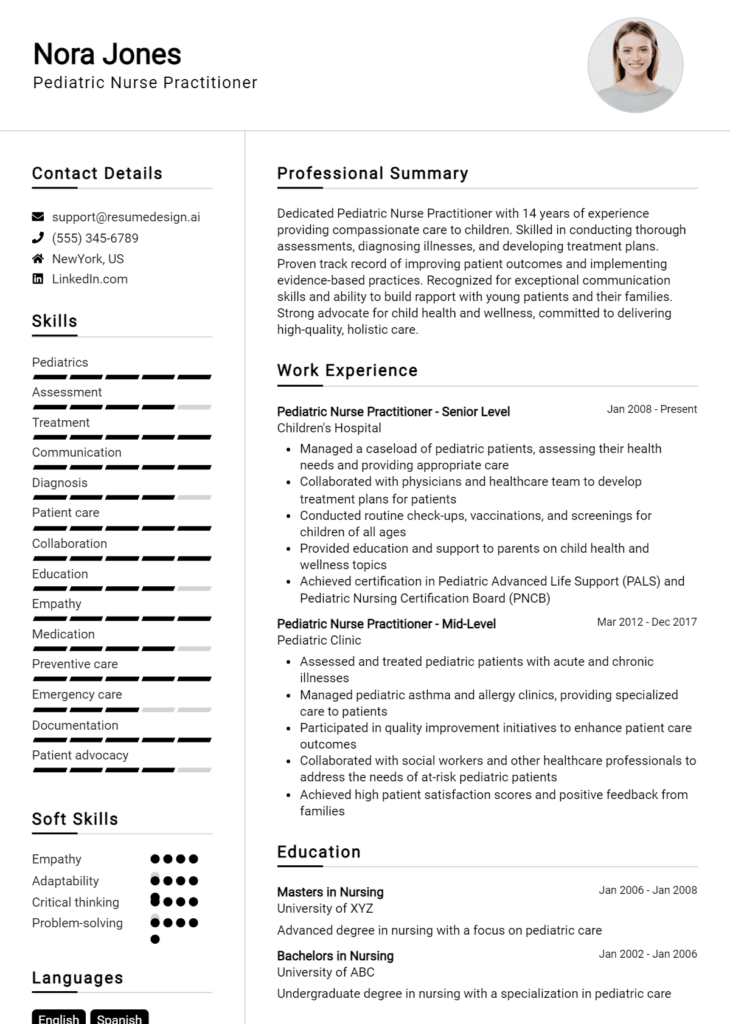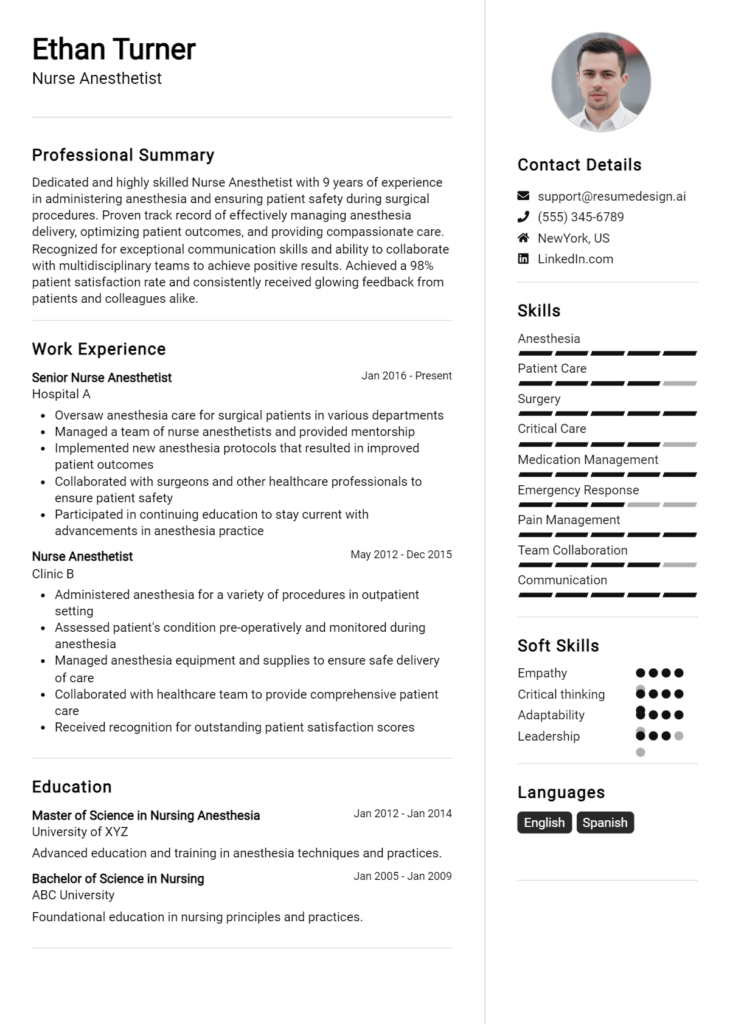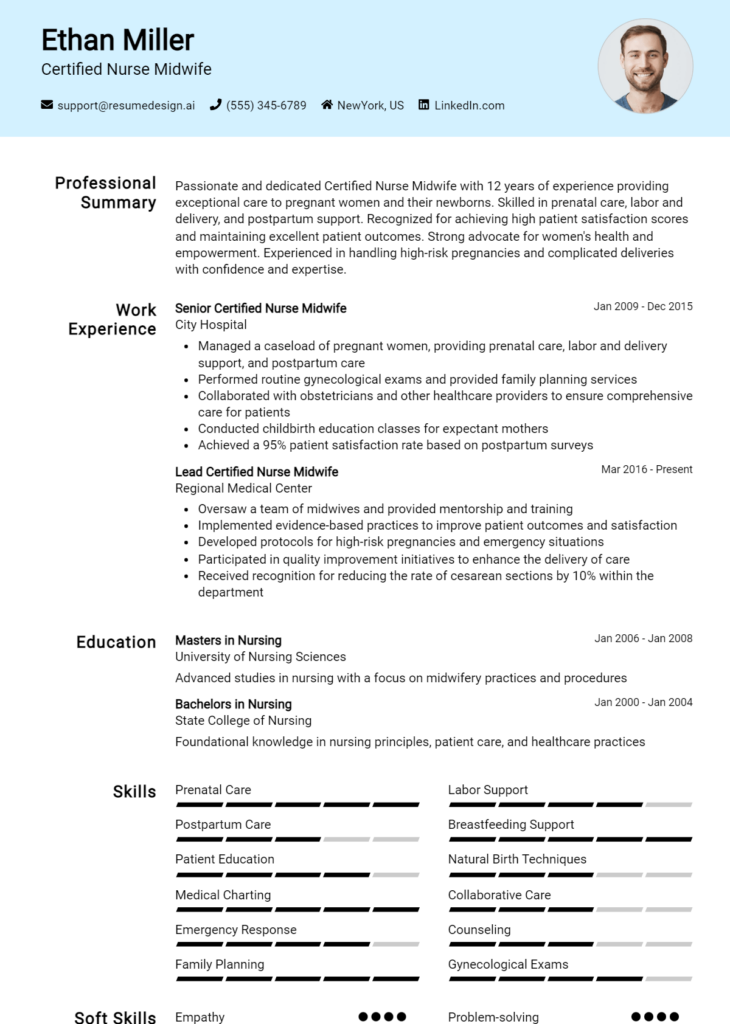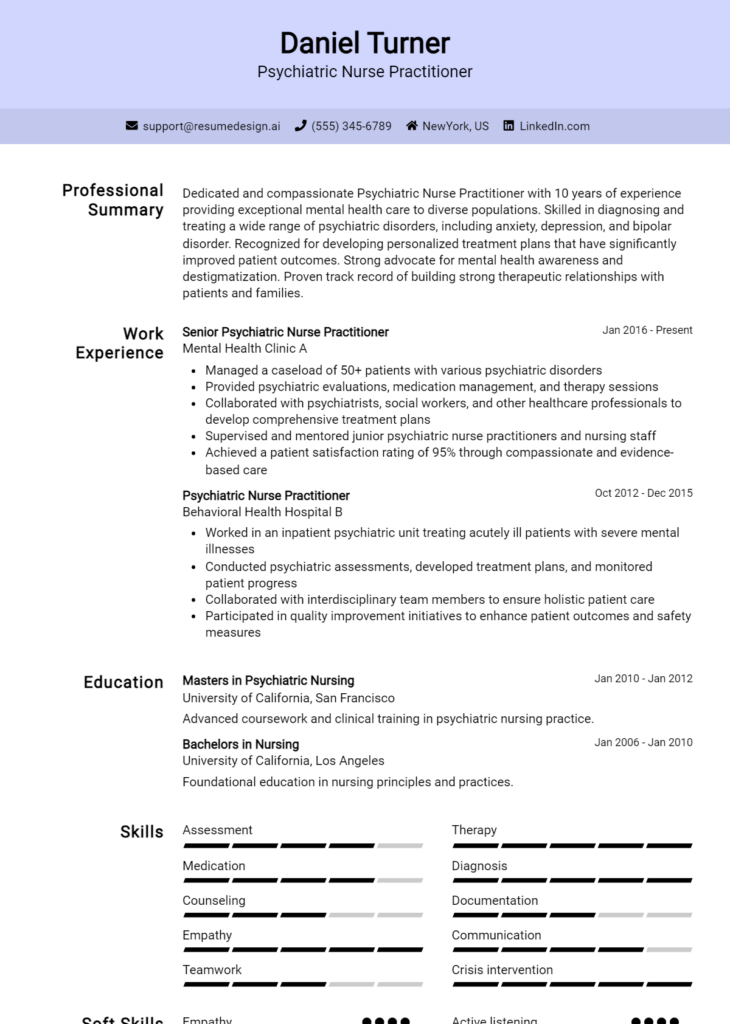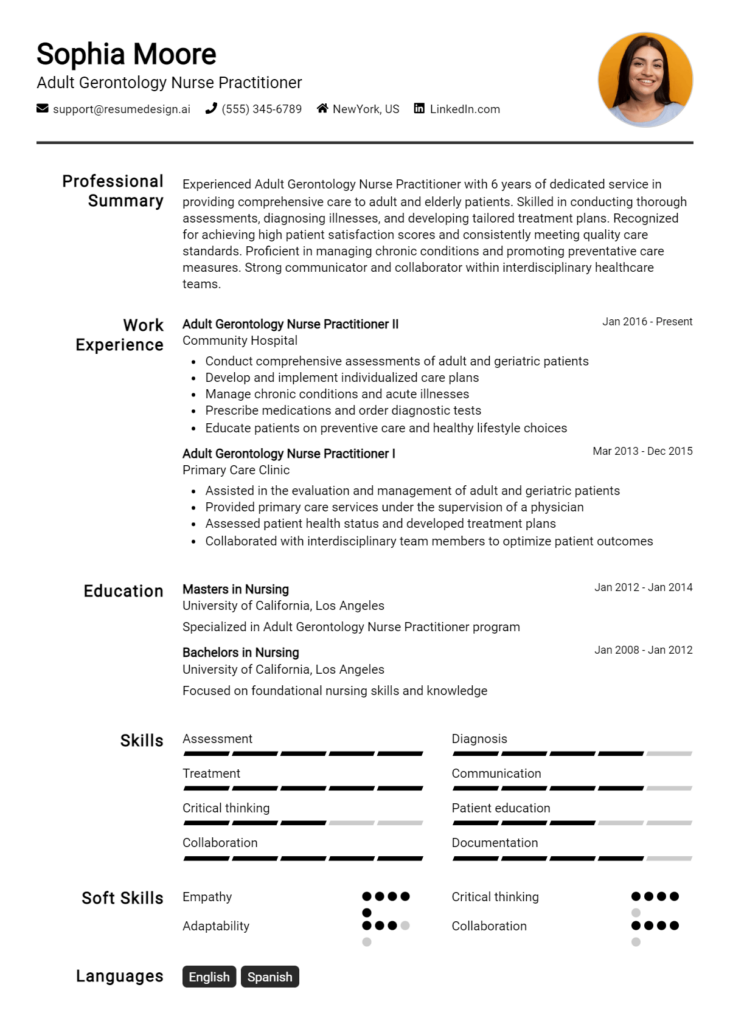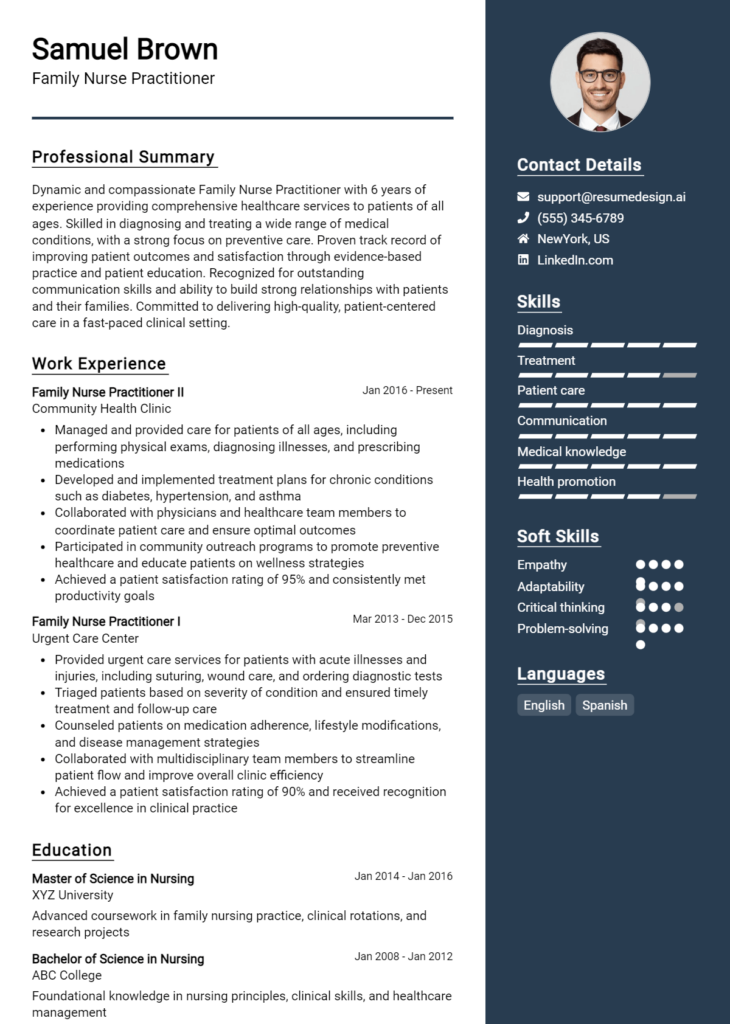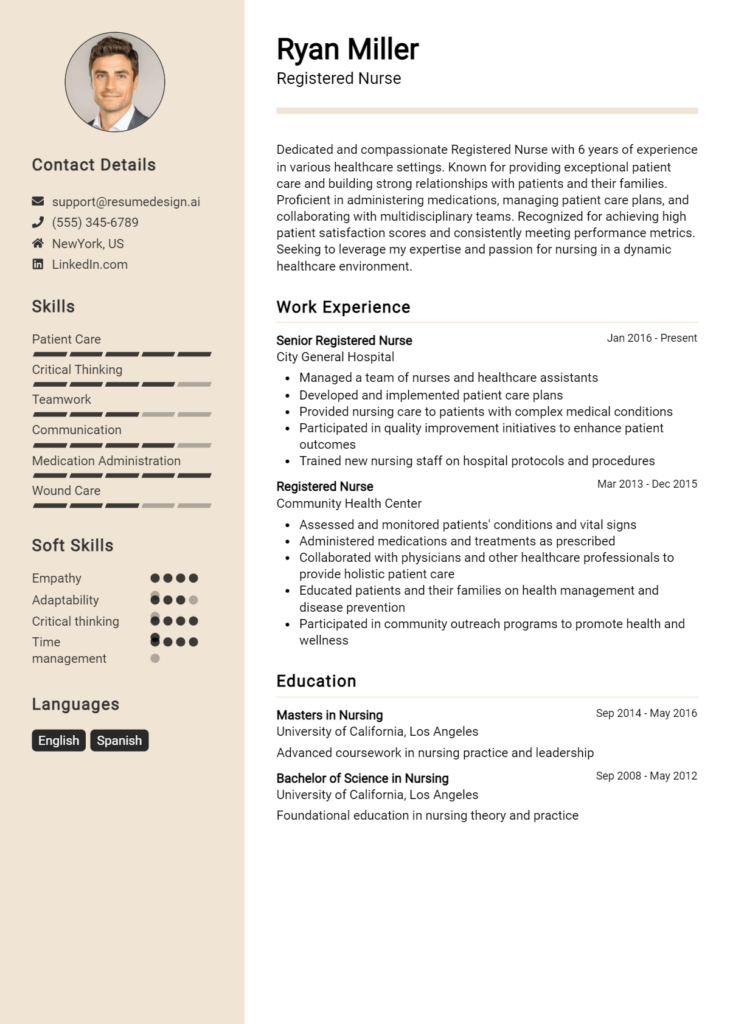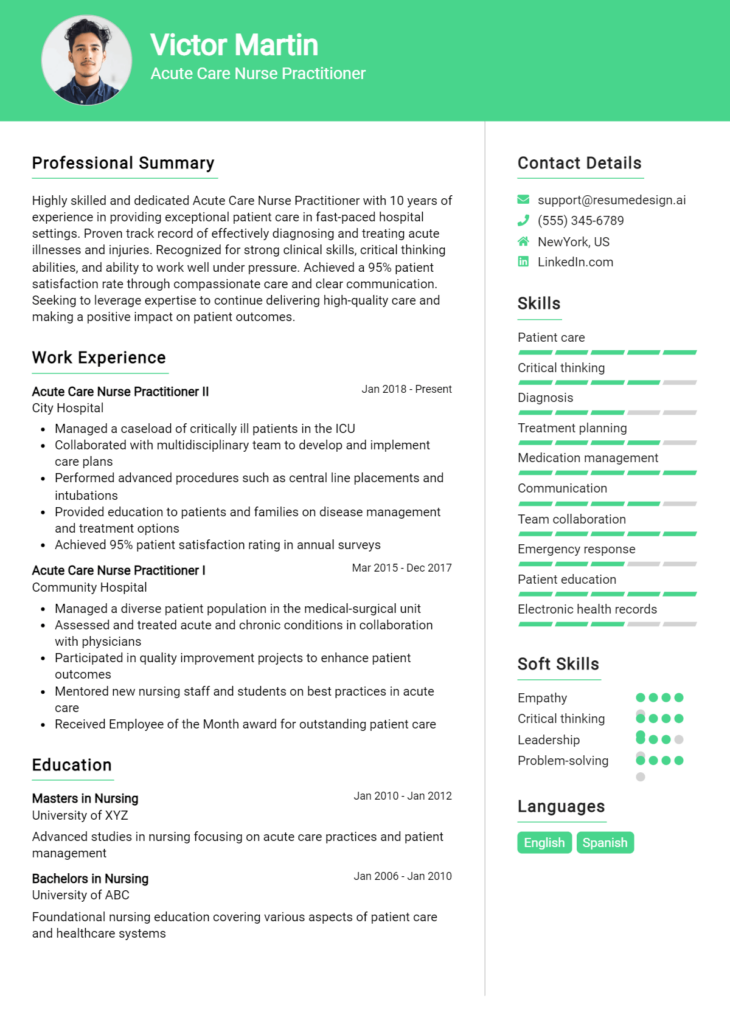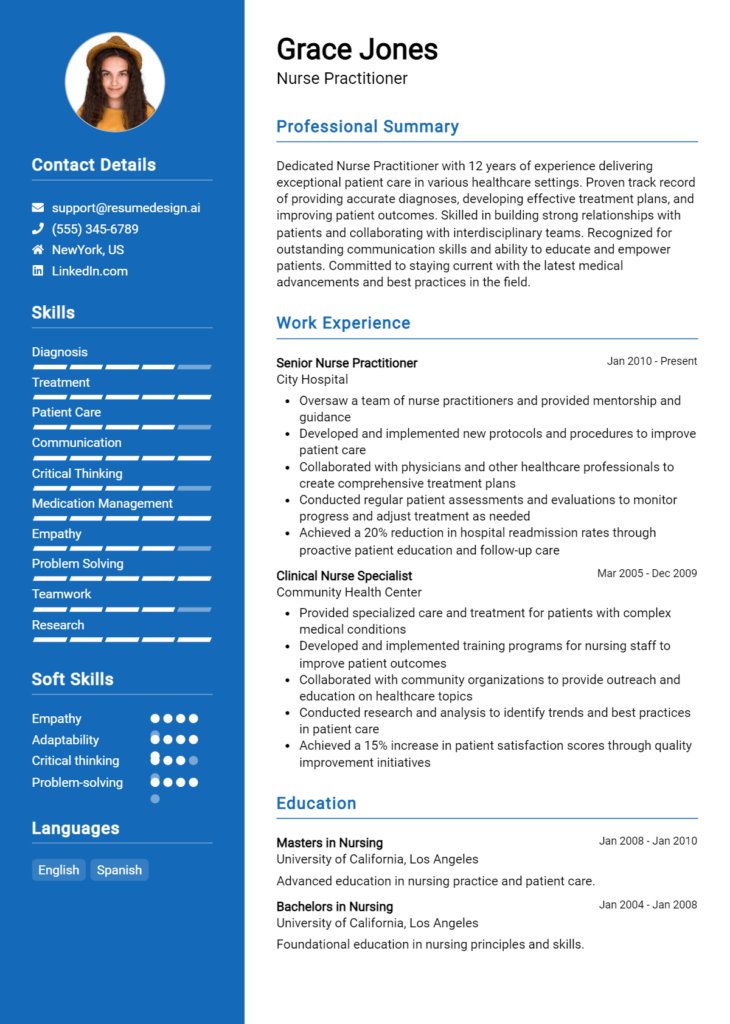Infection Control Nurse Core Responsibilities
An Infection Control Nurse plays a vital role in maintaining patient safety by preventing and controlling infections within healthcare settings. Key responsibilities include conducting surveillance, educating staff on infection prevention protocols, and collaborating with various departments to implement best practices. Successful Infection Control Nurses possess strong technical skills, operational knowledge, and problem-solving abilities. These competencies not only enhance patient outcomes but also align with the organization's overall goals. A well-structured resume can effectively showcase these qualifications, highlighting the candidate's expertise and impact.
Common Responsibilities Listed on Infection Control Nurse Resume
- Conducting infection surveillance and data analysis
- Developing and implementing infection control policies
- Providing education and training to healthcare staff
- Performing environmental assessments and audits
- Collaborating with multidisciplinary teams for infection prevention
- Monitoring compliance with infection control practices
- Investigating and reporting infection outbreaks
- Maintaining accurate records and documentation
- Staying updated on infection control guidelines and regulations
- Participating in quality improvement initiatives
- Advising on the use of personal protective equipment (PPE)
- Facilitating patient education on infection prevention
High-Level Resume Tips for Infection Control Nurse Professionals
In the competitive field of healthcare, a well-crafted resume serves as a crucial tool for Infection Control Nurse professionals. It's often the first impression a candidate makes on potential employers, making it essential to create a document that not only showcases one's skills and achievements but also aligns with the specific demands of the role. A strong resume can open doors to interviews and opportunities, allowing candidates to highlight their expertise in infection prevention and control. This guide will provide practical and actionable resume tips specifically tailored for Infection Control Nurse professionals, helping them stand out in a crowded job market.
Top Resume Tips for Infection Control Nurse Professionals
- Tailor your resume to the job description by incorporating relevant keywords and phrases that align with the specific requirements of the position.
- Highlight your relevant experience in infection control, including any clinical roles, education, or certifications that pertain to the field.
- Quantify your achievements by providing specific metrics or outcomes, such as reduced infection rates or successful implementation of infection control protocols.
- Showcase your industry-specific skills, such as knowledge of epidemiology, sanitation practices, and regulatory compliance.
- Include any relevant certifications, such as the Certification in Infection Control (CIC) or other specialized training that enhances your qualifications.
- Utilize a clean and professional format that is easy to read, with clear headings and bullet points to guide the reader through your experience.
- Emphasize your ability to work collaboratively with healthcare teams, as effective infection control often involves interdisciplinary cooperation.
- Incorporate continuing education or professional development courses related to infection control to demonstrate your commitment to staying current in the field.
- Consider adding a summary statement at the top of your resume that succinctly encapsulates your experience and career goals in infection control nursing.
By implementing these tips, Infection Control Nurse professionals can significantly enhance their resumes, increasing their chances of landing a job in this vital area of healthcare. A well-structured and targeted resume not only showcases qualifications but also communicates a strong professional identity that resonates with potential employers.
Why Resume Headlines & Titles are Important for Infection Control Nurse
In the competitive field of healthcare, the role of an Infection Control Nurse is pivotal in managing and preventing the spread of infections within healthcare settings. Crafting an effective resume headline or title is crucial for candidates in this role, as it serves as the first impression to hiring managers. A strong headline can immediately capture attention, summarizing a candidate’s essential qualifications in a concise and impactful manner. By presenting relevant skills and experiences in just a few words, a well-crafted headline helps to differentiate candidates and highlight their suitability for the position, ultimately increasing their chances of landing an interview.
Best Practices for Crafting Resume Headlines for Infection Control Nurse
- Keep it concise: Aim for a headline that is brief yet informative, ideally no longer than 10 words.
- Be specific: Use keywords and phrases that reflect your expertise in infection control.
- Highlight key qualifications: Focus on your most relevant skills and experiences.
- Use action words: Start with strong verbs that convey your proactive approach to infection prevention.
- Tailor to the job: Customize your headline for each application to reflect the specific requirements of the position.
- Incorporate certifications: If applicable, include relevant certifications or credentials to enhance credibility.
- Avoid jargon: Ensure that your headline is easily understandable, avoiding overly technical language.
- Make it engaging: Use language that resonates with hiring managers and showcases your passion for infection control.
Example Resume Headlines for Infection Control Nurse
Strong Resume Headlines
"Dedicated Infection Control Nurse with 5+ Years of Experience in Healthcare Settings"
“Certified Infection Prevention Specialist Committed to Patient Safety and Quality Care”
“Proven Track Record in Reducing Hospital-Acquired Infections through Evidence-Based Practices”
Weak Resume Headlines
“Nurse Looking for Job”
“Healthcare Professional”
Strong resume headlines effectively convey a candidate’s unique strengths and qualifications, immediately indicating their expertise in infection control and their commitment to patient safety. They stand out due to their specificity, relevance, and engaging language, which captures the interest of hiring managers. In contrast, weak headlines tend to be vague and generic, failing to provide any insight into the candidate’s skills or experience, which can result in missed opportunities in the competitive job market.
Writing an Exceptional Infection Control Nurse Resume Summary
A resume summary is a critical component for an Infection Control Nurse, as it serves as the first impression a hiring manager has of a candidate. A well-crafted summary quickly captures attention by highlighting key skills, relevant experience, and notable accomplishments in the field of infection control. It offers a concise snapshot of the candidate’s qualifications, making it essential to tailor this section to the specific job being applied for. An impactful summary can differentiate a candidate in a competitive job market, setting the stage for the rest of the resume.
Best Practices for Writing a Infection Control Nurse Resume Summary
- Quantify your achievements to provide concrete evidence of your impact.
- Focus on relevant skills, particularly those that align with the job description.
- Tailor your summary for the specific job you are applying for to demonstrate your fit.
- Keep it concise; aim for 3-5 sentences that are to the point.
- Use action verbs to convey a proactive approach and strong initiative.
- Highlight your certifications and specialized training in infection control.
- Include your years of experience in the field to establish credibility.
- Showcase your ability to work collaboratively with healthcare teams.
Example Infection Control Nurse Resume Summaries
Strong Resume Summaries
Dedicated Infection Control Nurse with over 5 years of experience implementing infection prevention protocols in acute care settings. Successfully reduced hospital-acquired infections by 30% through targeted staff training and rigorous compliance monitoring.
Certified Infection Control Nurse skilled in data analysis and surveillance techniques, with a proven track record of improving patient outcomes. Developed a comprehensive infection control program that resulted in a 25% decrease in surgical site infections over two years.
Compassionate and detail-oriented Infection Control Nurse with 7 years of experience in both acute and long-term care facilities. Led interdisciplinary teams to enhance infection control measures, achieving a 40% reduction in infection rates during my tenure.
Weak Resume Summaries
Infection Control Nurse with experience in various healthcare settings. I am a team player and work well with others.
Motivated nurse with a background in infection control. Looking for a new opportunity to apply my skills.
The examples provided illustrate the differences between strong and weak resume summaries. Strong summaries are specific and quantifiable, showcasing tangible results and relevant skills tailored to the role of an Infection Control Nurse. In contrast, weak summaries lack detail and specificity, making them less compelling and memorable to hiring managers. By focusing on measurable achievements and relevant experience, candidates can significantly enhance their chances of standing out in the job market.
Work Experience Section for Infection Control Nurse Resume
The work experience section of an Infection Control Nurse resume is a critical component that effectively showcases the candidate’s technical skills, leadership capabilities, and commitment to delivering high-quality healthcare outcomes. This section allows potential employers to assess the nurse's proficiency in infection prevention practices, their ability to manage and guide teams, and their success in implementing effective strategies that align with industry standards. Quantifying achievements, such as reducing infection rates or improving compliance with protocols, further strengthens the application by providing tangible evidence of the nurse's impact in previous roles.
Best Practices for Infection Control Nurse Work Experience
- Highlight specific infection control protocols and guidelines you have implemented.
- Include quantifiable results, such as percentage reductions in infection rates or improved compliance scores.
- Demonstrate leadership by detailing team management experiences or training initiatives.
- Showcase collaboration with multidisciplinary teams to enhance patient safety and care quality.
- Incorporate relevant certifications or specialized training related to infection control.
- Utilize action verbs to convey your contributions and accomplishments clearly.
- Align your experiences with current industry standards and best practices in infection control.
- Provide context for your contributions, explaining the challenges faced and solutions implemented.
Example Work Experiences for Infection Control Nurse
Strong Experiences
- Implemented a new hand hygiene initiative that resulted in a 30% decrease in hospital-acquired infections over six months.
- Led a cross-departmental team in developing an infection surveillance program that improved compliance rates from 70% to 95%.
- Conducted training sessions for over 50 staff members on infection control protocols, leading to a marked improvement in adherence to safety standards.
- Collaborated with the quality improvement team to analyze infection data, presenting findings that shaped hospital policy changes and enhanced patient outcomes.
Weak Experiences
- Responsible for infection control tasks in the hospital.
- Worked with a team on infection prevention efforts.
- Participated in some training regarding infection control.
- Assisted with data collection for infection statistics.
The examples of strong experiences are considered effective because they quantify achievements and clearly define the candidate's role in improving infection control practices. They illustrate specific actions taken and the positive results achieved, showcasing both technical expertise and leadership skills. In contrast, the weak experiences lack detail and specificity, making it difficult for potential employers to gauge the candidate's impact or competencies in infection control nursing. These vague statements do not demonstrate measurable outcomes or a proactive approach, which are essential for a successful Infection Control Nurse.
Education and Certifications Section for Infection Control Nurse Resume
The education and certifications section of an Infection Control Nurse resume plays a pivotal role in showcasing a candidate's academic qualifications and industry credentials. This section is essential for illustrating the depth of the candidate's knowledge, their commitment to ongoing professional development, and their alignment with the specific requirements of the role. By providing relevant coursework, recognized certifications, and specialized training, candidates can significantly enhance their credibility, demonstrating their preparedness to tackle the challenges associated with infection prevention and control in healthcare settings.
Best Practices for Infection Control Nurse Education and Certifications
- Include degrees related to nursing, public health, or microbiology to establish a strong academic foundation.
- Highlight industry-recognized certifications such as the Certification in Infection Control (CIC) to demonstrate expertise.
- Detail relevant coursework that emphasizes infection control, epidemiology, and patient safety.
- Showcase any specialized training or workshops attended that relate to infection prevention techniques.
- List ongoing education efforts, including webinars or conferences, to illustrate commitment to continuous learning.
- Ensure all information is current and reflects the latest standards in infection control practices.
- Organize the section clearly, prioritizing the most relevant qualifications to the role.
- Use specific dates for certifications and education to convey currency and relevance.
Example Education and Certifications for Infection Control Nurse
Strong Examples
- Bachelor of Science in Nursing (BSN), University of Health Sciences, graduated May 2020
- Certification in Infection Control (CIC), Certification Board of Infection Control and Epidemiology, obtained August 2022
- Advanced Infection Control Training, National Infection Prevention and Control Academy, completed June 2021
- Coursework in Epidemiology and Public Health, University of Medical Studies, completed January 2023
Weak Examples
- Associate Degree in General Studies, Community College, graduated May 2018
- Basic Life Support (BLS) Certification, expired January 2021
- Certification in Nursing Home Administration, obtained April 2019 (not relevant to infection control)
- Coursework in History and Arts, University of the Arts, completed December 2020
The strong examples listed above are considered robust because they directly relate to the core competencies required for an Infection Control Nurse, including relevant degrees, current certifications, and specialized training in infection control. In contrast, the weak examples highlight qualifications and certifications that lack relevance to the field of infection control, are outdated, or are not aligned with the essential skills needed for the role, thereby diminishing the candidate's credibility and appeal to potential employers.
Top Skills & Keywords for Infection Control Nurse Resume
In the dynamic field of healthcare, the role of an Infection Control Nurse is critical in safeguarding patient safety and public health. A well-crafted resume that highlights relevant skills can significantly enhance a candidate's prospects for securing a position in this essential area. Skills not only demonstrate a nurse's expertise and ability to manage infection prevention strategies but also showcase their capability to contribute to a collaborative healthcare environment. Effective communication, analytical thinking, and a solid understanding of infection control protocols are just a few examples of the competencies that can set a candidate apart. For individuals looking to tailor their resumes for this specialized role, focusing on both hard and soft skills is crucial to present a comprehensive picture of their qualifications.
Top Hard & Soft Skills for Infection Control Nurse
Soft Skills
- Strong communication skills
- Critical thinking
- Attention to detail
- Problem-solving abilities
- Team collaboration
- Empathy and compassion
- Adaptability
- Leadership qualities
- Time management
- Conflict resolution
Hard Skills
- Knowledge of infection control protocols
- Proficiency in data analysis
- Familiarity with epidemiology
- Experience with surveillance techniques
- Competence in risk assessment
- Understanding of microbiology
- Ability to conduct training and education sessions
- Expertise in policy development
- Proficient in electronic health record systems
- Skilled in outbreak investigation
For more insights on the skills needed in your resume and how to effectively present your work experience, consider exploring additional resources to enhance your application.
Stand Out with a Winning Infection Control Nurse Cover Letter
Dear [Hiring Manager's Name],
I am writing to express my interest in the Infection Control Nurse position at [Hospital/Institution Name] as advertised on [where you found the job posting]. With a Bachelor of Science in Nursing and over [X years] of experience in infection prevention and control within diverse healthcare settings, I am excited about the opportunity to contribute to your team. My background in clinical nursing combined with specialized training in infection control equips me with the skills necessary to effectively monitor, prevent, and manage infections in patients while promoting a culture of safety and compliance.
In my previous role at [Previous Employer's Name], I successfully implemented evidence-based infection control protocols that resulted in a [specific percentage] reduction in hospital-acquired infections over [specific time period]. I collaborated closely with multidisciplinary teams to conduct infection surveillance, analyze data, and develop targeted interventions tailored to our patient population. Additionally, I provided education and training to staff on best practices in infection prevention, reinforcing the importance of maintaining high standards of hygiene and patient care. My strong communication skills allow me to convey complex information in an accessible manner, ensuring that all staff members are engaged and informed.
I am particularly drawn to the mission of [Hospital/Institution Name] to deliver exceptional patient care through innovative practices. I am eager to bring my passion for infection control and my commitment to patient safety to your organization. I am confident that my proactive approach and dedication to continuous improvement will make a positive impact on your team and the community you serve.
Thank you for considering my application. I look forward to the opportunity to discuss how my skills and experiences align with the needs of your team at [Hospital/Institution Name]. I am excited about the possibility of contributing to your esteemed institution and am available for an interview at your earliest convenience.
Sincerely,
[Your Name]
[Your Phone Number]
[Your Email Address]
Common Mistakes to Avoid in a Infection Control Nurse Resume
When crafting a resume for the role of an Infection Control Nurse, it's essential to present your qualifications and experience effectively. However, many candidates often make common mistakes that can detract from their overall presentation and hinder their chances of landing an interview. Understanding these pitfalls can help you tailor your resume to better highlight your expertise and commitment to infection prevention and control.
Neglecting Specific Certifications: Failing to mention relevant certifications, such as the Certification in Infection Control (CIC), can make your resume less competitive. Employers look for specialized training in this field.
Using Generic Job Descriptions: Many applicants use vague descriptions of their previous roles. Instead, focus on specific responsibilities and achievements related to infection control to showcase your expertise.
Overloading with Jargon: While it’s important to demonstrate knowledge of infection control, overusing technical jargon can confuse hiring managers. Strive for clarity and ensure your resume is accessible.
Ignoring Quantifiable Achievements: Not including measurable outcomes, such as reduced infection rates or successful implementation of protocols, can weaken your impact. Use numbers to demonstrate your effectiveness.
Lack of Tailoring to Job Description: Copying and pasting a generic resume for every application can be detrimental. Always tailor your resume to highlight the skills and experiences that align with the specific job description.
Poor Formatting: A cluttered or unprofessional layout can detract from your qualifications. Use clean, organized formatting with clear headings and bullet points to enhance readability.
Failing to Highlight Soft Skills: Infection Control Nurses need strong communication and teamwork skills. Neglecting to mention these qualities can lead to an incomplete picture of your suitability for the role.
Skipping Continuing Education: Not including ongoing education or training related to infection control can signal a lack of commitment to professional development. Highlight any relevant courses, workshops, or conferences attended.
Conclusion
As an Infection Control Nurse, your role is critical in preventing and managing infections in healthcare settings. Throughout this article, we have highlighted the essential skills and qualifications needed for this position, including a strong understanding of infection prevention protocols, excellent communication skills, and the ability to work collaboratively with healthcare teams. Additionally, we discussed the importance of ongoing education and training in adapting to new healthcare challenges.
Now that you are aware of the key competencies required for an Infection Control Nurse, it’s essential to ensure that your resume effectively showcases your experience and skills. Take the time to review and update your resume so it stands out to potential employers.
To assist you in this process, consider utilizing various resources available to enhance your application materials. You can explore resume templates to find a design that suits your professional style, use a resume builder for a user-friendly experience in crafting your resume, browse resume examples for inspiration, and check out cover letter templates to complement your application.
Don’t miss the opportunity to present yourself as a qualified Infection Control Nurse. Start reviewing your resume today!

